Who can I trust – there is so much conflicting information
I remember when I first had my son, Logan. Yes, I’m talking about a human child, but stick with me, it is relevant, I promise.
I drove myself round the bend, worrying about whether I was getting it right. I’d read so many books while pregnant, but my views were completely different when he arrived.
So what did I do? I turned to Google, of course!
And I didn’t stop there. I read various books, talked to friends, and tied myself in little knots once I’d acquired a ton of conflicting advice.
It was overwhelming, confusing, and very unhelpful.
We all have really good gut instincts, but we go down these rabbit holes seeking information, and we often end up ignoring or even fighting against our gut.
I have clients who have achieved great results using books or videos from YouTube. They have developed amazing skills which have helped them to train their dogs. But there is still something missing.
For a lifetime of success, understanding, and a strong bond with your dog, you need to not just be able to teach behaviours but to have a clear understanding of your dog’s behaviour.
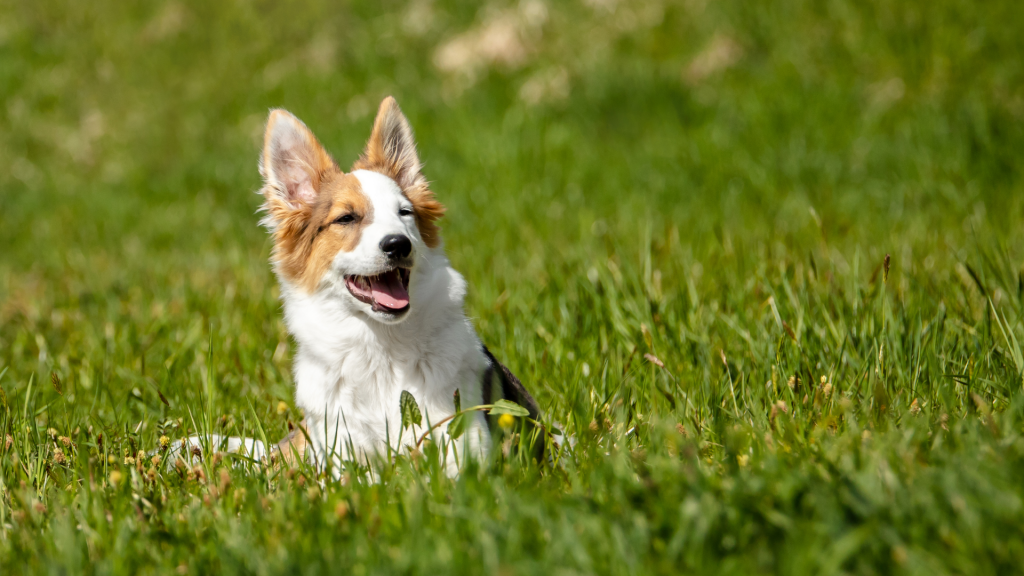
What’s beneath the problems you are experiencing? When you understand your dog’s specific needs, what motivates him, what he struggles with and what emotions he is experiencing, you are both set up for an incredible relationship.
That can’t be taught in a generic video or picked up from a well-meaning dog friend because your dog is unique. There will be different motivations, life experiences, breed traits and so much more that affect your dog’s perspective on the world.
Let’s go back to Logan for a minute. Imagine I told a friend he screamed all night, and I was at my wit’s end. And imagine my friend told me that she had a similar experience, and her baby was hungry, so she gave her an extra feed before bed, and the problem was solved.
So off I toddle, and I give Logan a huge top up feed before bedtime. Only he doesn’t sleep soundly. He screams even more and for longer. Because the reason he couldn’t sleep was reflux, and the extra milk just made that 10x worse. This is a made-up story, but I just want to highlight how if we seek out information without a two-way exchange, it can quickly lead us into bigger problems.
Just like children, our puppies and dogs need us to be consistent. And with the best of intentions, when we bounce from pillar to post trying different techniques from various people, it simply doesn’t work. In fact, a lot of the time, it creates bigger problems, because we are now unpredictable to our dogs (or kids), and that doesn’t foster confidence or security.
Why do people get puppy blues?
How could you not love that gorgeous puppy, right? Wrong. There are plenty of reasons why you might dislike your puppy, and it’s actually a very common experience.
But there is hope! Many of the problems listed above have tried and tested solutions that are worth a try before you make a decision to rehome your dog.
Toilet training a new puppy or any dog in a new environment can be tricky, and if you’re house proud, it can be frustrating and upsetting when your home suddenly becomes your dog’s toilet, and your nice carpet or flooring starts to get damaged.
First things first, try and be patient (especially with puppies). Remember that their whole world has recently been turned upside down, and everything is new to them, so cut them a little slack. Invest in some good carpet cleaner and if you can try and get one that removes the smell of urine – there are a few on the market and even some home recipes online. Dogs tend to mark their territory and you’ll find they will keep revisiting the same spot unless you can remove the smell.
A lot of people try the puppy training pads and slowly move them closer to the door, and some people go down the route of ‘poochie bells’ where you hang them on the door handle and ring them every time you go out, so the dog starts to associate going to the toilet with the bells and eventually starts to nudge them independently to tell you when they need to go out.
To be honest, for me, just old-fashioned perseverance worked with Buddy. I followed the rule of thumb that every time he ate, woke up from a nap or had playtime, I scooped him up and took him outside. These are generally the key times they need to go to the toilet. Of course, we had accidents, but positive reinforcement with praise and treats when he went outside eventually got through to him.
Whatever you do, please do not scold your dog if you find they’ve had an accident after the fact. They will not understand what they have done wrong 10 minutes after they have done it, and it will just confuse them more. If you spot them in the act, then scoop them up the best you can and put them outside or wherever you want them to learn to go, and they will soon get the hang of it.
It only took Buddy a month or so to really get the hang of things, and now he has such amazing control and now often goes out for a bedtime wee at 8 pm and it’s a mission to drag him out of bed for his morning wee 12 hours later!
Biting is a tough one and something I struggled with a lot. Biting in puppies is most commonly a sign of teething that can last six to eight months.
My sister and I always joked that puppy teeth were like needle shark teeth, and Buddy’s tendency to nip was quite bad. I found that he would chomp at my ankles, jump up and snag his teeth on my clothes and rip them, nip my hands when I tried to play with him, and being perfectly honest it really hurt!
On top of being a bit sleep-deprived and generally worn down from my new responsibilities, I now had my own personal piranha, and it was really hard not to react badly and shout at Buddy when he continuously nipped and hurt me. So what was the answer?
I think it’s important to remember that puppies are exploring the world with their mouths, it’s how they learn. Puppies often learn what is called bite inhibition when they play with their littermates.
If you find that when you are trying to play with your puppy they are nipping you then letting out a high-pitched yelp helps them to understand that they have hurt you the way a littermate would show them. Stop playing with them and walk away, and the negative result will help to learn they should not be biting you.
One of the hardest things I found about controlling the nipping and biting was more my ability to control my reaction to it. A dog trainer explained to me that my natural reaction to shout out and move away quickly would trigger the ‘prey drive’ in Buddy, and he would think it was a game of chase.
As strange as it sounds, she recommended me washing my wellies and starting to wear them in the house. That way, if Buddy took a chomp at my ankles I wouldn’t feel anything or react. I could simply stay still, firmly say ‘no’, and walk away calmly so he knew I wasn’t playing anymore. I have to say it worked a treat! My other handy tip was as soon as I got home, I got changed into the same pair of old leggings that already had rips in so if further damage was done by accident, I didn’t become even more frustrated that more clothes had been damaged. I’m not saying you have to walk around in the same pair of trousers and wellies in your house for the rest of your life, but I did this for the worst period as a coping mechanism, and it really helped me.
Puppies have a tendency to chew things that they shouldn’t – your shoes, furniture, your hands, you name it. From my experience, this can be caused by a couple of things. When Buddy was younger, this was a sign of his teething.
The process of teething is an uncomfortable one where their gums are hot and itchy, and they are frustrated and don’t know what else to do but bite and chew things to alleviate that discomfort. There are lots of specific teething-type toys and chews out there for puppies you can buy, but a great tip I was given was to saturate an old tea towel and twist it round, then pop it in the freezer. Once frozen, you can give this to the puppy to chew and the coolness helps soothe their gums. Similarly, frozen carrot slices work well too and are a healthy snack for them.
The other cause of chewing that I observed with Buddy when he was around 6 months old was boredom. I found that Buddy started to destroy his bed when I went to work, and this was a typical sign that he was bored.
At this stage, I was working full time and coming home at lunch to take him for a walk, but it was obvious that at this stage of his life that wasn’t enough stimulation for him. In my personal circumstances, I made the decision to start taking him to doggy daycare, so he wasn’t bored and since then, he has never chewed or destroyed anything in the house. I appreciate not everyone can afford daycare, but understanding that chewing is often a sign of boredom can help you work towards fixing the issue either with longer walks, more enrichment games and so on.
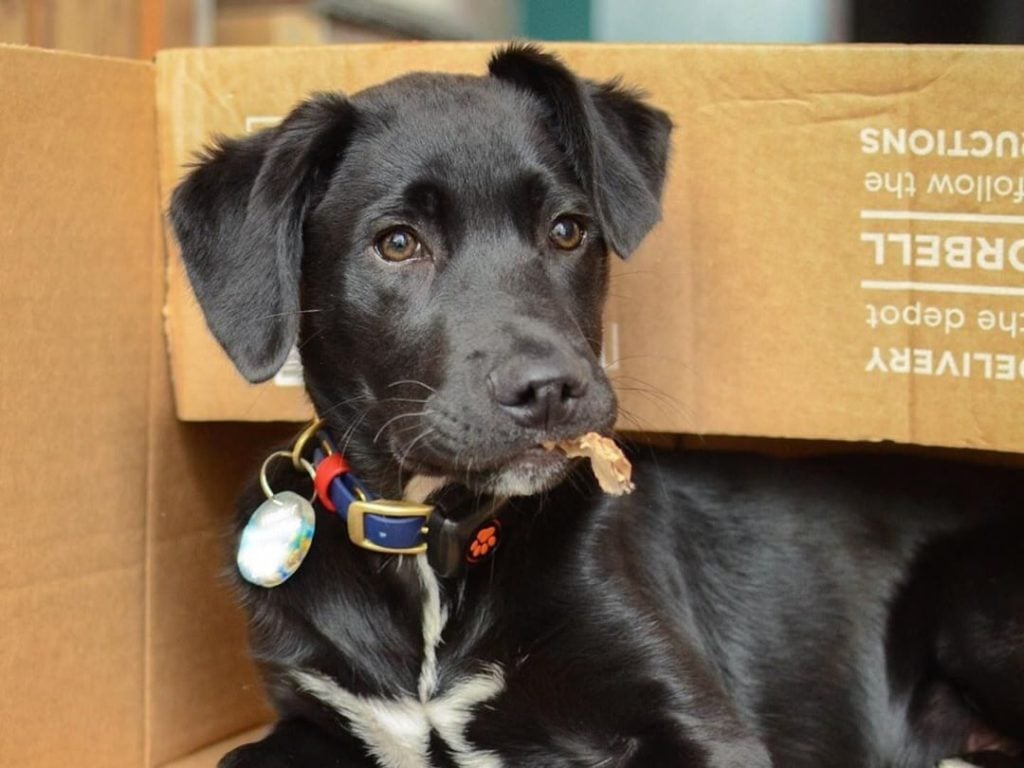
Barking is a dog’s way of communicating with us. There can be many reasons for a dog barking, and it is perfectly normal, but there can come a stage where it becomes excessive and can cause great amounts of stress for you as a dog owner. Below are a few of the reasons your dog may be barking:
I think the first step in tackling the barking issue is to try and work out which of the above type of barking your dog is doing. For example, if your dog is ‘watchdog barking’ and it drives you crackers, close your curtains so they can’t see out and set them off. (This is a Buddy special so something we have to do quite often if there is a lot of activity going on outside).
To try and help manage the barking situation there are a couple of different things you can try. Make a point of rewarding calm, quiet behaviour. Give them lots of fuss, tickles and praise when they are calm and relaxed, and on the occasions when they are being noisy, try and ignore them to show that the attention-seeking behaviour doesn’t work! Dogs are very intelligent and will soon figure out what you want from them.
A favourite trick that I use on Buddy is the distraction technique – particularly when he has a bee in his bonnet about something he has seen outside. Often I will get out some treats and do a mini-training session with him where we do the basics like sit, paw, lie down, roll over and high five. By the time he has finished doing his tricks, he has forgotten what he was barking about, and peace is restored.
From my personal experience, I think a calm environment helps a lot. Buddy is a Cockapoo, so typically quite a giddy breed. It’s great to have playtime and ensure he is enriched and entertained, but I also make a point of having downtime where he knows it’s time for a lie-down and a tummy stoke or a cuddle on my knee while I watch TV or do some work.
Also, just to finish on this section, if you still think your dog is excessively barking and it doesn’t seem to fit in any of the above categories, consider arranging a quick check-up with your vet to rule out anything physiological – remember, your dog is trying to communicate with you about something and if it’s not obvious what that is then a trip to the vet will help give you peace of mind.
Resource guarding is the term for when a dog becomes protective over something. The resource itself that the dog chooses to guard can be food, treats, toys, a place (a bed or favourite chair), or even a person. It is not uncommon and can happen towards other dogs or even humans.
Typically a dog would display this behaviour by growling or barking as someone gets closer to the item they are trying to protect. This is the dog’s way of saying they want some space. A great tip for this is making sure that your dog has a special place in your home where they feel safe and they can go there and be left alone.
This is often very important if you have young children that can sometimes be overwhelming for your dog and they need a place to escape. It’s important to teach children not to go near the dog if they are in their ‘safe space’. For Buddy, he had a large cage (where the door was left open) with blankets draped over 3 sides, so it was quiet, dark and cosy.
If your dog gets hold of an item they aren’t meant to have and you need to retrieve it, then your best bet is to go for the diversion method. Sometimes the ‘leave it/drop it’ command just won’t cut it, so you need to offer a tasty morsel or toy that they absolutely love, known as the ‘high-value reward’. This might be their favourite ball, a little bit of cheese or hot dog sausage. Show them they will get something even better and place it away from them and 9 times out of 10 they will drop the item in favour of the thing you want to get back.
Please remember that resource guarding is normal behaviour for most dogs but use common sense when it comes to the level of aggression a dog is showing and if necessary seek professional advice if you think it is something that needs addressing.
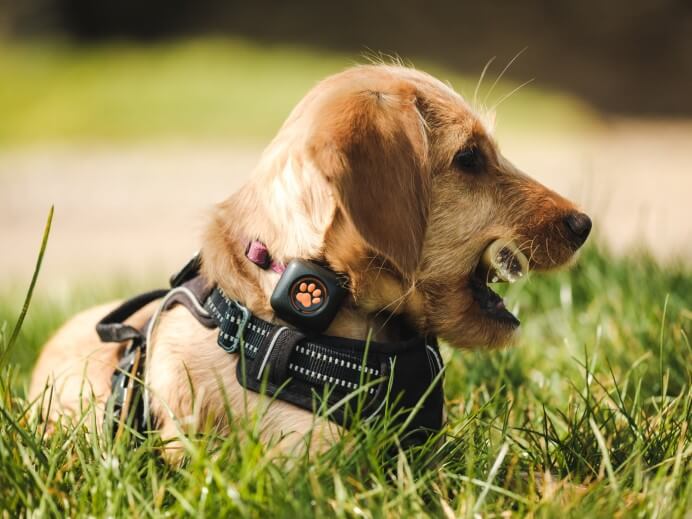
You would be amazed at the number of people I hear from who say they are feeling really low after getting their new dog/puppy and want to know if it is normal. The answer is yes!
When I got Buddy, I lived on my own and was working full time. I had been waiting to get a dog for the last 5 years and had done extensive research and preparation, so, in theory, I was as prepared as I could possibly be, but wow, it was hard.
It wasn’t so much the physical changes in my life (getting up early to let him out to the toilet, not being able to go out for more than 2 hours in those early months, watching him like a hawk constantly to make sure he wasn’t going to the toilet in the house, chewing or eating something he shouldn’t) but in fact, it was the emotional side of things.
Getting a puppy is different for everyone. Some people already have children and know what it is to have another life depend on you 100%, some people already have a dog and are used to tailoring their lifestyle to accommodate their needs and some, like me, go from having a responsibility-free life to suddenly having this gorgeous bundle of fluff rely on them for everything. My point is everyone approaches being a puppy owner from a different place and we all cope in different ways so it is inevitable that we all have different reactions and experiences to bringing that puppy home and whatever emotions you go through that is okay!
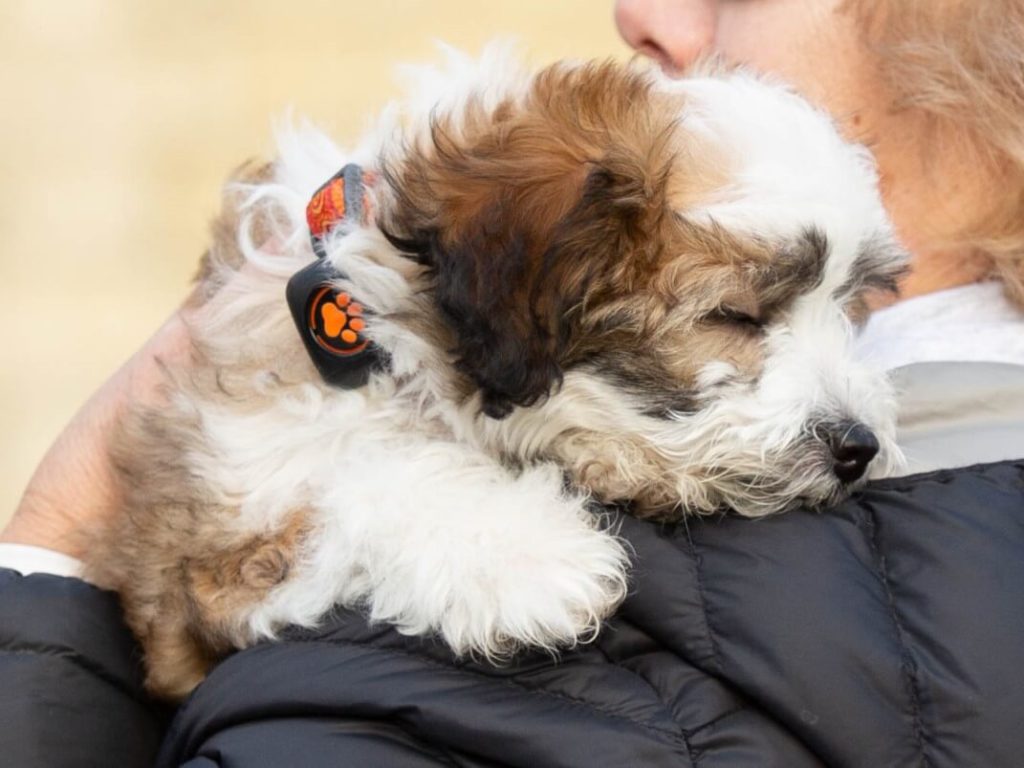
I remember distinctly thinking after the first week, ‘what have I done?!’ I was tired from the middle of the night get-ups to the toilet, frustrated because my adorable puppy kept nipping and hurting me and was feeling very confined to my house as I didn’t want to leave him, and he hadn’t finished his vaccination course so we couldn’t even go out for a walk yet.
Here was this defenceless puppy who wanted nothing but love from me, and I was starting to resent him, which then gave me feelings of guilt on top of that. I had imagined having this wonderful puppy that I could bond with who would want to sit and cuddle on my knee and be my best friend. Instead, I had a wriggly piranha who didn’t want to sit still for 30 seconds, let alone be cuddled. I thought I had made a huge mistake.
What really helped me in those early days was the support of friends and family. My mum offered to come and look after Buddy for a couple of hours every now and then so I could have some ‘me time’ (whether that was to go meet a friend, hit the gym or just clean my house without Buddy attacking the hoover) and it made a huge difference.
Once Buddy had received his full course of vaccinations, I was able to go out and meet friends with dogs for walks and start socialising with Buddy, which was very important. I also joined a Cockapoo group on Facebook, which was a great source of support for people going through similar experiences and was one of the inspirational factors for me coming up with the idea for K9 Nation.
If you encounter any negative emotional responses to your new dog, you need to be okay with that. Don’t beat yourself up or think you aren’t ‘normal.’ I think there are common misconceptions that having a new puppy should be all cuddles and joyous picture-perfect moments, and it’s not at all. Don’t give yourself a hard time – just recognise that you have made a big life-changing decision and allow yourself time to adjust. Reach out to your support network so that they can help you. Find a way to make time for yourself again, and don’t feel guilty about it. Find a local dog walker/daycare if you can afford it so that if you need the odd day off or have something you need to do, you have a backup plan. If you can’t afford that, then find a local neighbour or friend who loves dogs and would be happy to dog sit for you. Look for friends on the K9 Nation site who can help ease the burden and arrange meetups.
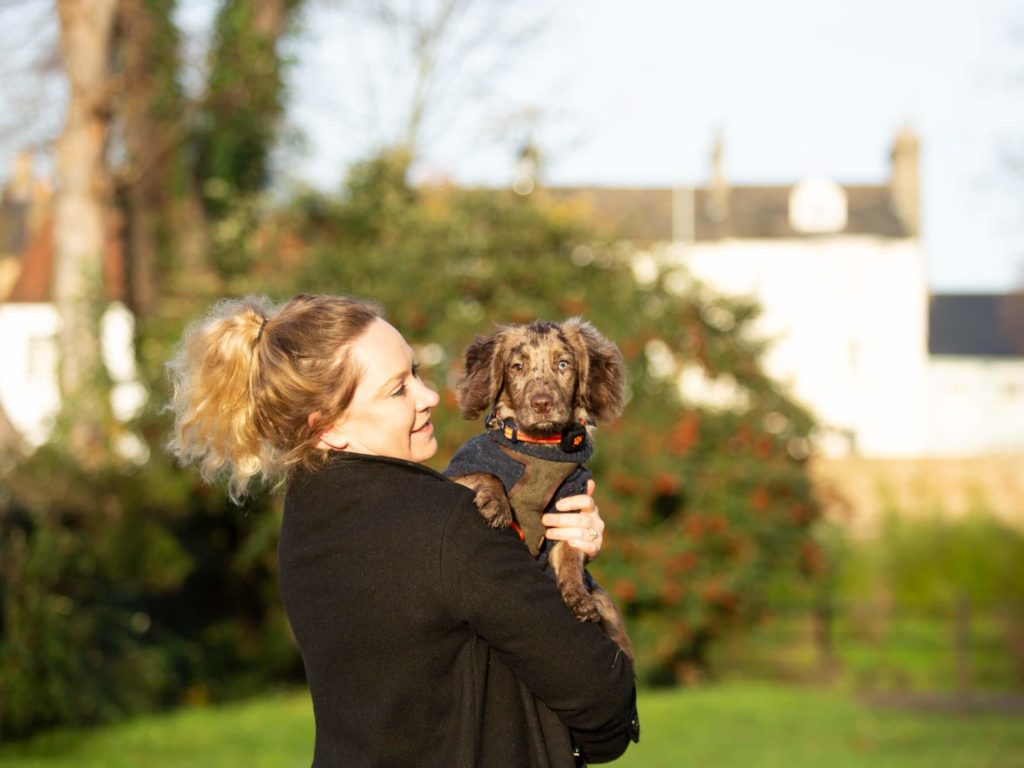
Owning a dog is a huge responsibility, and in those early days, it can be very tough. I can openly admit that I didn’t enjoy my first 9 months that much with Buddy, but I wouldn’t change it for the World. He is now 4 years old and the best possible dog I could ask for, which has made it all worthwhile.
I created K9 Nation because I wanted a free online platform for all dog owners in the UK to make dog ownership as easy as possible. I wanted to create a supportive community and help bring dog owners together to share experiences and advice. Whether you want inspiration for a new walk, to plan a fun family day out and want to know where you can go with your dog or simply need to find a local groomer… my vision is that K9nation will be that one-stop shop for all your needs and I can’t wait to see it grow.
For those who have decided that rehoming is the only option, please consider what is right for the dog. I don’t want to go into too much detail as there is lots of advice online for what to do and it’s not the focus of this blog but remember there are several options you can explore:
I guess, to draw this to a close, I would just like to encourage people who are struggling and maybe questioning whether or not to rehome their new dog to persevere and give their dog a chance. A lot of the things I have mentioned above are all surmountable and support is out there if you need it. The reward for your persistence through the tough times is your dog’s unconditional love for the whole of their life. One of my favourite quotes that I like to remember is, “He might only be here for part of your life, but for him you are his whole life.”
An insight into the partnership between PitPat & K9 Nation, and their campaign, the K9 Clean Up.
Why is my puppy so hard to train?
Your 9-week old puppy cannot physically hold their wee and poo in. They are not developed enough to do so. Your puppy doesn’t have the capacity to be fully toilet trained until approx 16 weeks old, when he can begin to learn to hold his toileting needs until he’s in an appropriate place.
That doesn’t mean there’s no point in doing any toilet training. There is. But it means that you can allow yourself to relax a little and enjoy the little successes which are slowly adding up.
Let go of berating yourself (and your puppy) whenever you find a puddle somewhere you’d rather not. It’s going to happen. Stock up on kind words for yourself and your puppy, enzymatic cleaner to remove odours and stains, and treats for celebrating the toileting that is happening in the right places.
And trust that it will pay off. These little accidents may be frustrating, but they won’t be forever.

The puppy biting you’re experiencing is also normal. Your puppy is teething, prone to becoming overtired in the blink of an eye and learning about the world with her mouth. You can do things to help your puppy with their sore teeth, but it is unrealistic to think you can completely eradicate any biting.
Those sleepless nights or hideously early mornings? Yup, normal! Again, there are things we can do to make it easier on you and your puppy, but it’s unlikely that you’ll be gifted a puppy who sleeps 12hrs straight as soon as they enter your life.
The fun and joy you expected from puppy life are in there. You will enjoy your life with your dog. The puppy blues will pass!
You just need some help to adjust your expectations so that you can revel in your training successes and actually recognise when they happen. You might find that your puppy training is actually going swimmingly, you just need a different perspective… and perhaps a couple of small tweaks to help you on your way.
Puppy Blues 101
Getting a puppy is an exciting time, especially if you are a first time puppy parent.
I bet while you were waiting to bring home your puppy you thought about what it would be like to live with them.
Maybe you were dreaming of puppy cuddles and kisses or a sweet playful puppy who adores you?
But the reality of living with a puppy can be very different from what we see on TV. When this happens people can get the “Puppy Blues”.
You may have heard the term puppy blues in the past, but not known what it meant. Or maybe you are feeling overwhelmed or regret and don’t understand why. The most common reason the puppy blues happen is when life with your puppy doesn’t turn out the way you thought it would. This can affect everyone differently.
For some people they may feel sad, depressed or lonely, others may feel anxious or overwhelmed. It’s not unusual to want to cry. You may feel like your life will never be the same as it was before the puppy. Some will feel regret and want to return the puppy. Others still will start to have second thoughts about whether they were ready to get a puppy in the first place.
Whatever you are feeling know that you are not alone. Those first couple of weeks is the hardest but it does get better.
So you may be wondering what causes the puppy blues. After all you were so excited to get your new puppy. So what changed? The causes will differ by person but the most common reasons are:
Absolutely! I know I did the first week we brought home our puppy. Since this was not my first puppy as an adult, I thought I knew everything I needed to know about taking care of a puppy. But our previous dog, Molly was 4 months old when we brought her home. Although she was still a puppy we missed a lot of the early puppy behaviors, like chewing on everything and biting us all the time. Plus with Molly, it was just my husband and me in the house. This time around we had two school aged kids to care for too.
The funny thing is we chose to get a puppy because we were hoping it would help with some of the stress our family was feeling. We had read that dogs were great stress relievers for kids. I can tell you the first few weeks of Bella living with us were anything but stress free. I worried about everything.